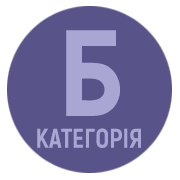FORMATION OF INTERCULTURAL COMPETENCE OF NON-NATIVE SPEAKERS IN THE PROCESS OF LEARNING UKRAINIAN AS A FOREIGN LANGUAGE UNDER WARTIME CONDITIONS (BASED ON THE UKRAINIAN-TURKISH PROJECT)
DOI:
https://doi.org/10.32782/philspu/2025.10.15Keywords:
Ukrainian as a foreign language, non-native speakers, intercultural competence, cultural adaptation, formation of intercultural competence under wartime conditions, academic partnership, communicative engagement method, A.S. Makarenko Sumy State Pedagogical University, Istanbul UniversityAbstract
The article explores the formation of intercultural competence among non-native speakers in the process of learning Ukrainian as a foreign language (UFL) under the conditions of the Russo-Ukrainian war, which has significantly impacted the educational process.Employing methods of analyzing scholarly works, generalizing data from official websites of higher education institutions, and observingthe educational process, the authors examine the challenges of distance learning and student adaptation. Key concepts (interculturalcommunication, intercultural linguistic identity, and intercultural competence of non-native speakers) are defined as the foundationof a competence-oriented process implemented through communicative-activity, student-centered, and sociocultural approaches.The wartime conditions exacerbate these processes due to psychological stress, limited access to immersive language environment,and the urgency of adaptation, particularly for learners outside Ukraine.A focal point is the importance of developing academic mobility and scientific-educational partnerships between Ukrainian and foreign universities. Participation of lecturers and students in international academic exchange programs, inter-university projects, and summer schools enhances the formation of intercultural competence for those learning UFL, whether within the cultural-educational environment of Ukrainian universities remotely. Significant value for the development of educational programs at Sumy State Pedagogical University named after A. S. Makarenko (Sumy SPU) is derived from the experience of teaching UFL in foreign universities, particularly Istanbul University (Turkey).The article describes the experience of implementing the inter-university partnership project «Ukrainian as a Foreign Language Without Borders,» initiated by lecturers from Sumy SPU (Ukraine) and Istanbul University (Turkey). The project, focused on cultural-educational and research collaboration, aims to provide practical support to students in developing intercultural competence and toencourage tolerant communication through cross-cultural discussions, workshops, roundtables, and scientific-practical conferences.The organization of the educational process in both universities incorporates interactive methods and informal education, fostering the socialization of non-native speakers.The essence and methodology of the communicative engagement method are outlined, which involves language learning through active immersion in a cultural environment. This approach ensures the organic integration of linguistic and cultural knowledge, transforming the educational process into a space of continuous intercultural interaction. Key components include the use of authentic materials, visualization (videos, presentations), linguocultural commentaries, and modeling of intercultural communication scenarios.The effectiveness of these practices is noted in developing non-native speakers’ ability to apply knowledge of linguistic norms, social roles, and communicative strategies according to specific interaction contexts.A significant role is played by the Ukrainian Cultural Club in Istanbul and extracurricular activities at Sumy SPU, which promote tolerance, empathy, and adaptation to the Ukrainian-speaking environment through participation in international competitionsand cultural initiatives. The conclusion highlights that the formation of intercultural competence among non-native speakers under wartime conditions is achievable through the synergy of academic partnership, cultural dialogue, pedagogical support, and active student engagement in intercultural initiatives.
References
2022 Duolingo Language Report. URL: https://blog.duolingo.com/2022-duolingo-language-report/
Корчук О. Сучасні аспекти викладання природничих дисциплін нерідною мовою. Світові виміри освітніх тенденцій: зб. наук. пр. / за заг. ред. Г.В.Межжеріної, О. Ю. Корчук. Вип. 16. Київ: НАУ, 2023. С. 11–17.
Губа Л., Перинець К. Інтенсив-курс з української мови як іноземної: теоретично-практичні засади. Актуальні питання гуманітарних наук. 2022. Вип. 53(1). С. 291–297.
Попело О. В., Попело О. П., Самойлович А. Г. Поточний стан розвитку закладів вищої освіти прикордонних регіонів України. Актуальні проблеми розвитку економіки регіону. 2025. Т. 2, № 21. С. 69–79. DOI: https://doi.org/10.15330/apred.2.21.69-79
Стандартизовані вимоги: рівні володіння українською мовою як іноземною А1–С2. Зразки сертифікаційних завдань: посіб. Київ: Фірма «ІНКОС», 2020. 186 с.
Кушнір І. М. Формування міжкультурної білінгвальної мовної особистості іноземних студентів-медиків в академічному середовищі українських ЗВО. Міжкультурна комунікація в університетському освітньому про- сторі: кол. монографія / за ред. Н. І. Ушакової. Харків, 2019. С. 108–122.
Семеног О. М., Левенок І. С. Формування українськомовної компетентності іноземних студентів-медиків в культурно-освітньому просторі закладу вищої освіти. Викладання мов у вищих навчальних закладах освіти на сучасному етапі. 2021. Вип. 38. С. 170–188.
Гулецька Я. Г. Полікультурна освіта студентської молоді в університетах США: автореф. дис. … канд. пед. наук: 13.00.01 – загальна педагогіка та історія педагогіки. 2008. 21 с.
Semenog O. The Conceptual Sphere of Education in Ukrainian and Polish Discourses: An Interdisciplinary Approach: monograph. Europe: Scholars’ Press, 2025. 195 p.
Боринштейн Є. Р. Соціокультурні особливості мовної особистості. Соціальна психологія. 2004. № 5(7). С. 63–72.
Ткаченко Д. І. Розвиток міжкультурної компетентності як ключовий елемент професійного зростання молодого викладача в глобалізованому освітньому просторі. День науки: програма та матеріали / ред. К. В. Аста- хова та ін. Харків: Вид-во НУА, 2025. С. 178–181.
Ушакова Н. І., Тростинська О. М. Вивчення української мови студентами-іноземцями: концептуальні засади. Теорія і практика викладання української мови як іноземної. 2014. Вип. 9. С. 12–21.
Генеральне консульство України в Стамбулі. Кількість студентів українського відділення у Стамбульському університеті збільшується – генконсул Олександр Гаман. URL: https://istanbul.mfa.gov.ua/news/kilkist-stu- dentiv-ukrayinskogo-viddilennya-u-stambulskomu-universiteti-zbilshuyetsya-genkonsul-oleksandr-gaman
Кількість студентів українського відділення університету у Стамбулі збільшується. Укрінформ. 2021. 27 жовт. URL: https://www.ukrinform.ua/rubric-diaspora/3340222-kilkist-studentiv-ukrainskogo-viddilenna-u-stambuls- komu-universiteti-zbilsuetsa-genkonsul.html
Кушнір І. М. Сучасна лінгводидактика української мови як іноземної: досягнення, проблеми, перспективи. Викладання мов у вищих навчальних закладах освіти на сучасному етапі. Міжпредметні зв’язки. Наук. дослідження. Досвід. Пошуки: зб. наук. пр. Харків, 2019. Вип. 34. С. 93–107. DOI: 10.26565/2073-4379- 2019-34-07
Український культурний клуб (Істанбул). URL: www.instagram.com/iukraynakulturu
Будник О. Мар’яна Барчук-Галик, викладачка відділення україністики Стамбульського університету: Для турків вивчати українську мову – це екзотика та великий виклик, але попит зростає з року в рік. Укрінформ. 2022. 18 лип. URL: https://www.ukrinform.ua/rubric-diaspora/3531565-marana-barcukgalik-vikladacka-viddilenna-ukrainisti-ki-stambulskogo-universitetu.html
Ду Женюе. In Taras Shevchenko’s works, I find my freedom. Мій Шевченко: зб. есе учнівської та студентської молоді / ред. Т. М. Шарова, А. В. Землянська. Київ, 2025. С. 49–52.
Семеног О. М. Наукова українська мова (для іноземних аспірантів): навч. посіб. Суми: СумДПУ імені А. С. Макаренка, 2025. 78 с.








